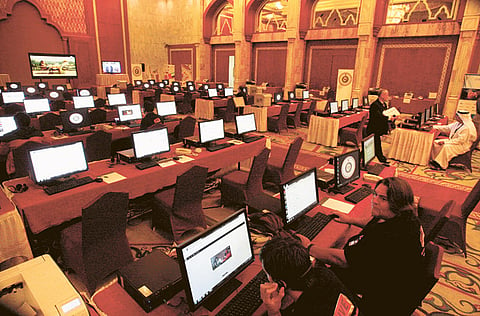Imported interest rates not suitable for domestic conditions
Monetary union will help avoid currency fluctuations in the Gulf Cooperation Council states

Dubai: The leaders of the Gulf Cooperation Council states (GCC) are expected to discuss the progress and future of monetary union at the Abu Dhabi summit beginning on Sunday.
The UAE withdrew from the monetary union following a dispute over the location of the joint monetary council, a precursor to the GCC central bank. Oman pulled out in 2006 and has ruled out a comeback.
However, on the eve of the summit, a Saudi newspaper quoted Sultan Bin Saeed Al Mansouri, UAE Economy Minister, as saying the UAE hopes it and Oman will rejoin the planned Gulf single currency project one day.
"The Emirates still hope that there will be a single currency for the countries of the [Gulf Cooperation] Council one day," Al Mansouri was quoted as saying by Saudi newspaper Al Eqtisadiah.
Common destiny
"We in the Emirates believe our destiny is in the common Gulf region, whether economically, politically or socially," he added.
Al Mansouri could not be reached to verify his comments.
Analysts say Gulf economies are susceptible to cyclical US fluctuations due to their currency peg.
"In the Gulf, the imported interest rates are not suitable to domestic economic conditions. The only alternative is to have a monetary union and common monetary policy independent of US monetary policy. But it needs political will. Until such times Gulf economies will be prone to wild cyclical fluctuations," said Dr Willem Buiter, Chief Economist of Citigroup.
Mohammad Bin Obaid Al Mazroui, GCC assistant secretary-general for economic affairs, told Gulf News recently that the exit of the UAE undermines the unified currency project. However, the UAE decision doesn't diminish the overall viability of monetary union and there are persisting efforts to bring the Emirates back to the union.
"We need a monetary union that will support the maturing process of our economics for this to be achieved, the right structure and rules must be clearly in place from the outset and all members must take equal responsibility for its success," he said.
While efforts are underway to salvage the projects, the turmoil in Europe has increased scepticism over the future of the Gulf common currency.
Economic leverage
In May, Abdul Rahman Al Attiyah, secretary-general of the GCC, said that he expected that Oman and the UAE would rejoin the single currency, but only after it had been launched.
He also added that he did not see monetary union being launched before 2015. An initial agreement had planned for the launch of notes and coins in 2010, but the GCC abandoned those plans last year.
Economists say monetary union would boost the GCC's political and economic leverage in the region through policy coordination.
"While the common currency is expected to enhance growth prospects of the region it can help the development of regional bond and equity markets," said Garbis Iradian, Deputy Director, Africa Middle East Department of Institute of International Finance.
Sign up for the Daily Briefing
Get the latest news and updates straight to your inbox


